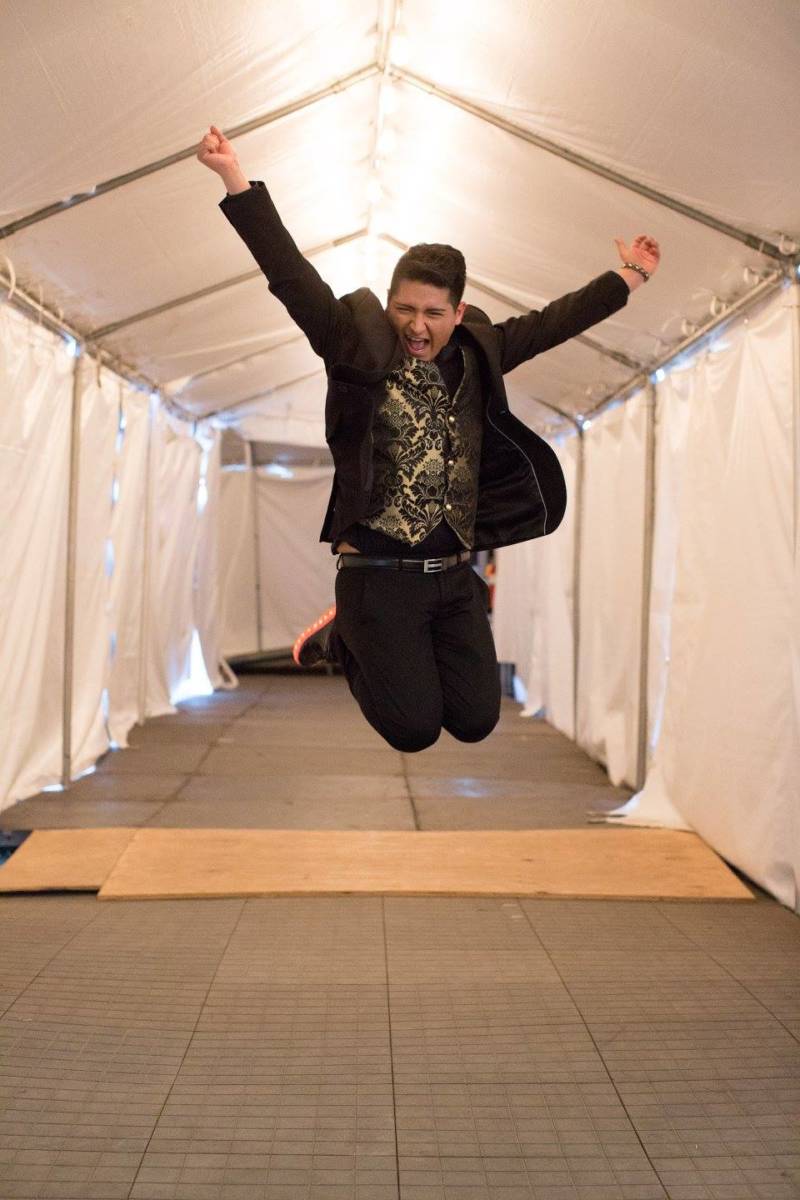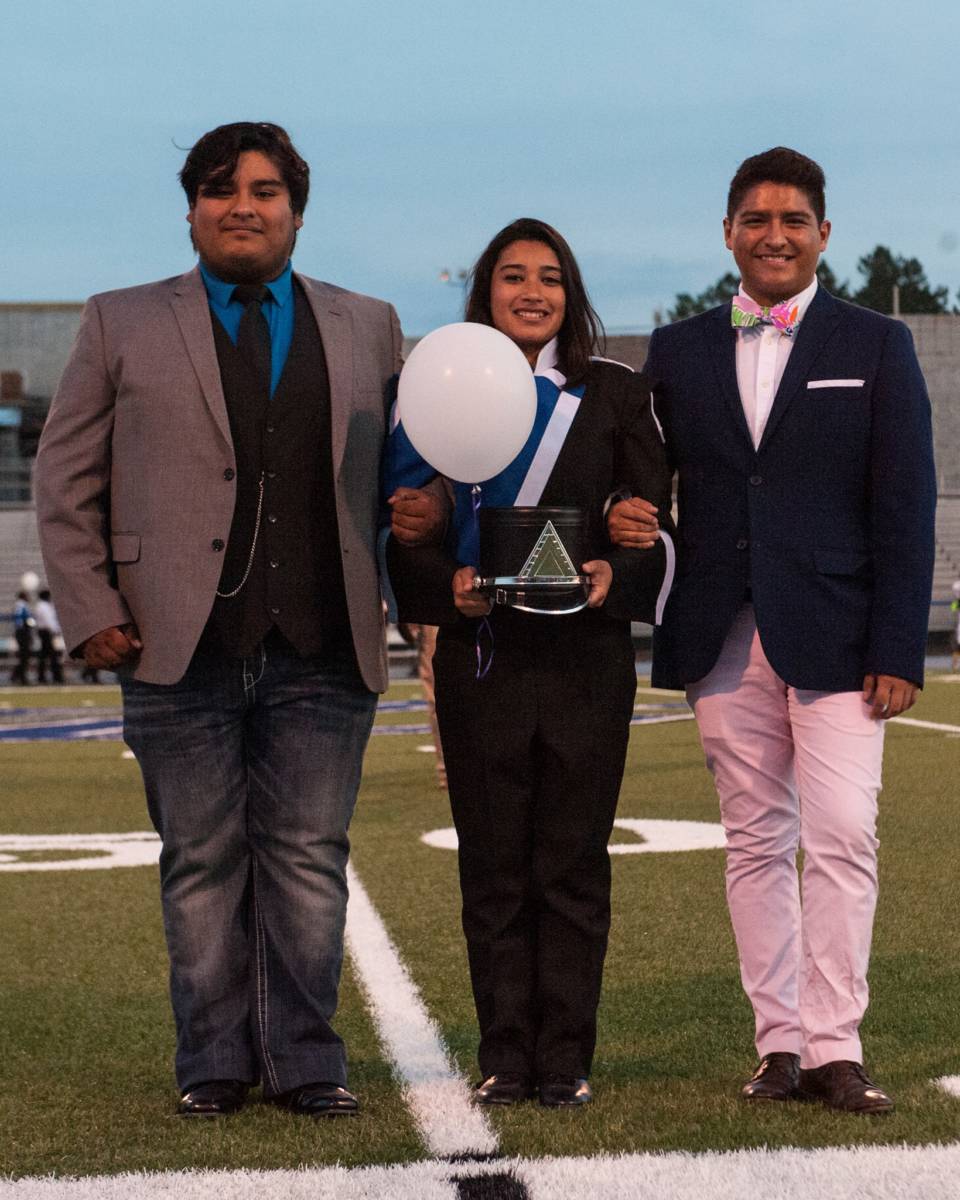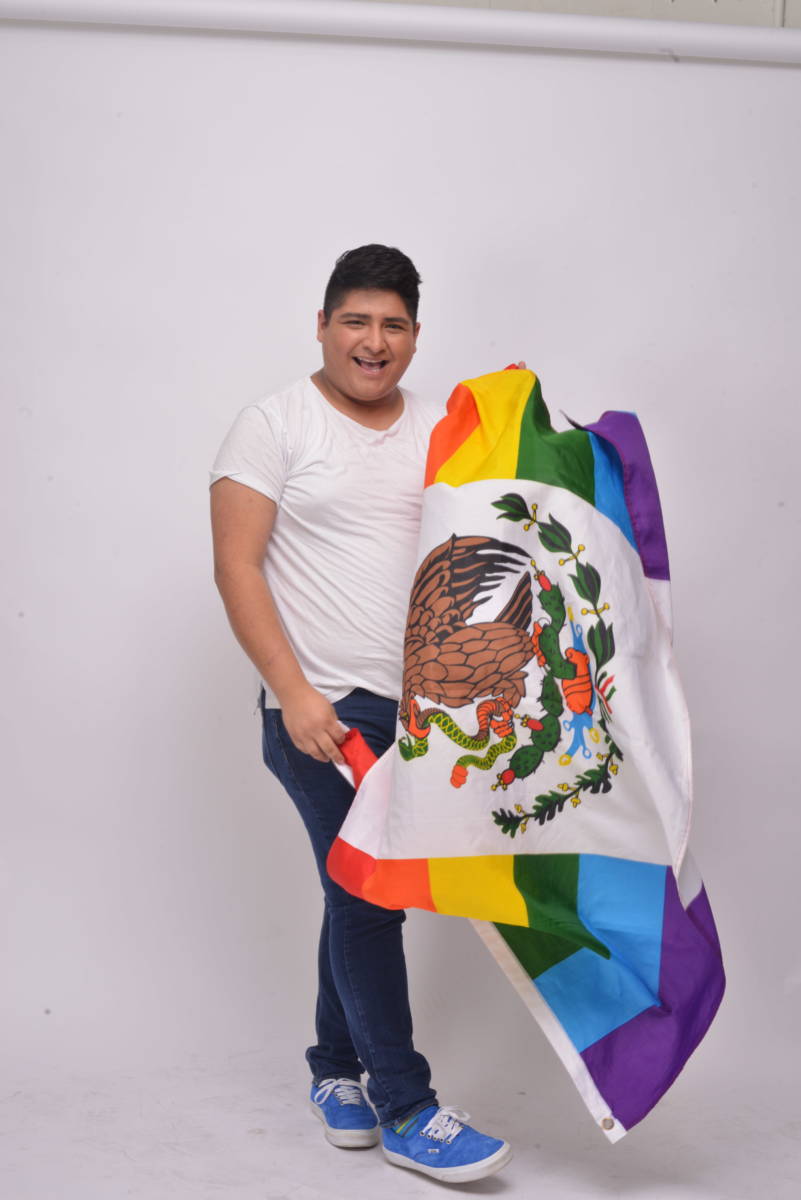Posted in Immigration, Uncategorized
As we look back at nine years of DACA, we met with Dreamers to hear their stories and concerns about the future as the discussion continues to evolve. This week we sat down with Jonatan Guerrero-Ramirez to hear about his journey. Jonatan is a Deferred Action for Childhood Arrivals (DACA) recipient who currently lives in Charleston, South Carolina. Born in Mexico, he was only five years old when he and his two siblings, both under the age of two, crossed the border with the help of his mother’s friends. Over the years he has not only developed into a successful young adult here in the states, but an advocate for immigrant and LGBTQI+ communities through his work.

Thanks so much for speaking with us Jonatan. To get started, can you tell us about your family? Do you have siblings?
We are a little small family. It’s me, my younger siblings. I have two of them. It’s my mom and dad. When I say small, we have a big family, but unfortunately, it’s really just us here in the US. We come from a big family, but it’s just me, my siblings, and my parents. My parents still live in Georgia. They were able to buy their own house after so many years of renting. They were able to buy a small plot of land and house there. My brother recently moved to South Carolina and my sister recently moved to Florida. All three of us have DACA too.
All of you moved to US?
Yeah, my sister was not even a year old. We moved here in early 2000 so I was about five. My sister was barely a year, and my little brother was not even two years old. I was the oldest. I still remember not a lot of details but living in San Miguel where I’m originally from. I remember how we got over, me seeing my dad for the first time, and my mom too.
What do you remember about coming here?
A lot of people risk their lives coming through the desert. Again, I was five, my sister was barely one and my brother couldn’t talk at the time. I remember them at the time telling me, Oh I’m going to give you candy, and if someone asks you question act like you don’t speak yet. I’m going to assume it was at the border, and I remember bright lights, and they were asking me questions like what’s my name and all I remember was me eating my little lollipop. I was following directions because my mom’s friend has more candy and I want some [laughs]. I remember that and next thing I know we show up to this apartment complex by Anaheim California and I see my dad in the middle of the night. I just run up to him and hug him.
Your dad came here first?
Yeah, he had moved here first. He did the crossing the border, going through the desert. He came here first, and then I came here with those people, and my mom came later afterwards.
So, you started in Anaheim. How did you end up in Georgia?
Something in my family we don’t talk about is why we moved here. Why we went to California and why we went to Georgia. In our family we try really hard to have a positive atmosphere [laughs]. We are a family happily ever after family in this house. It is something I’m very curious about, but we don’t talk about that stuff. When we first moved here, we lived in California for a while. I don’t remember the city exactly, but it was around Anaheim. I went to school there for a little bit. My dad then got a job in Georgia, so we hopped on a plane and moved to the other coast.
How aware were you of your legal status growing up?
Not really, because our family really just tries to think about positive and growing. My parents did not really tell me anything. Honestly, a lot of people my age at the time knew about our illegal status. I did not know about my legal status until I was about 16. I asked my dad “Hey, can I start studying for my driver’s license test,” because I really wanted to take Driver’s Education in high school and that’s when I found out about my status.

During the George W. Bush Administration’s second term Immigration and Customs Enforcement (ICE) raids were greatly ramped up. The federal government coordinated hundreds of sweeps targeting illegal immigrant workers. The Bush administration incorporated a more robust deportation system in place that would go well into the Obama administration before it was reexamined in 2014.
If somebody knew there was a traffic stop or checkpoint, someone would post it on Myspace or call each other and tell one another to stay home because Georgia state patrol is doing checkpoints around town. So, we would stay at home. It was upsetting. I would want to go to the park, or I would ask my mom “Hey, mom can we go to McDonalds down the road because I wanted a McFlurry,” but we would have to stay home. At the time the Bush administration launched ICE raids where they could go into public spaces and ask people for documentation. In our small town, we only had one big grocery store – Walmart. We would go to the store and if my mom saw police outside, we would turn back around and go home, because at that time ICE agents can ask for documentation at Walmart. It is funny because in fourth grade we were learning about Anne Frank. It is when I started comparing my situation to Anne. At that age it didn’t click to me, because I don’t know anything. Are we bad people?
How did you react to learning about your status?
It really changed because I didn’t know what it meant, you know? I didn’t understand why it was so important to have a social security number. Why does it matter that I have this little number? What do you mean I can’t just go drive a car? I can go drive a car, but I can’t do it legally because I don’t have a piece of paper.
At the time I wanted to go to be in the entertainment world or be a music therapist, but I was told I couldn’t. What do you mean I can’t go to school? What do you mean I can’t get my masters or be a doctor? What do you mean I can’t go to college to study theatre? Those kinds of things started clicking to me. As I was a junior, a lot of kids would go to college visits and my counselor would ask “Would you like to go to Georgia State this weekend for a visit?” and I would say “I can’t because I don’t have legal status, so why would I go if I can’t go here.”
None of our counselors or teachers would know what to do. Senior year hit and again people are planning for colleges, people are you know getting accepted. They’ll read their names on the intercom. It was hard. Luckily, senior year is when the DACA program finally launched. I graduated high school and immediately got DACA the following week.
On June 15, 2012, a new program was announced by the U.S. Department of Homeland Security (DHS) following an executive order by President Obama. The program prevented the deportation of undocumented youth who came to the United States as children. These youth, known as Dreamers, were granted “deferred action,” a type of temporary permission to stay in the U.S. This program would be called Deferred Action for Childhood Arrivals, or DACA. This June marks nine years since the beginning of the program.
Dreamers are youth who have grown up American and identify themselves as Americans. They mainly speak only English having come to the U.S. at such a young age. Under current law, most Dreamers have no way to gain permanent residency despite having lived in the U.S. most of their lives. DACA provides a renewable two-year deferment from deportation action and eligibility to obtain a work permit but is not a path to citizenship. Despite these limitations, the program has been a huge success, allowing DACA recipients to support their families and communities.
What was it like applying to colleges?
A lot of people didn’t know what it was [DACA]. Even when I first got DACA I wanted to go to school, so I applied to a bunch of schools and was straight up honest with people. “Hey, I’m not a legal citizen. I’m not an alien.” And they would be like “Well, what are you then?” I have this I told them. I have my social security card. I have a license.
Many said “Sorry. You are not a US citizen, you’re an alien. Technically we can’t accept you.” I ended up going to college here in Charleston. I went to the art institute. At the time we could only go to school at private institutes. I went to the art institute and got in.
There was a lot of uncertainty regarding DACA when the previous administration aimed to shut it down beginning in 2017. Can you talk about what it was like during that time?
In 2017 when they rescinded DACA, it was like, what do we do now. At the time I already graduated college. I was working in my field. Personally, I’m one of those people who likes to have answers, a plan. When this hit, I didn’t know what to do now. I graduated college. I’m in debt. I’m working in my field. And now my legal status is about to be taken. It was scary not knowing what to do. At that point was when I started to understand how laws work so yeah. It was like very unsure.
Activism has been a large part of your identity for the past few years. How do you begin participating in it?
My parents honestly don’t understand. They don’t get activism. What is it? I work at We Are Family Charleston now. They think I work at We Are Family and just do the thrift store. We also do more than that. We advocate for queer youth. When I tell them we go to Columbia to testify, they ask “Why would you testify? Are you getting paid for that?”

In South Carolina, we have over 5,660 DACA recipients who have contributed $35.8 million dollars in federal taxes and $18.9 million dollars in state taxes. If DACA were to end, South Carolina would lose over $247 million dollars in annual GDP.
Dreamers not only have contributed financially to South Carolina’s economy but worked in critical sectors of the state’s workforce. Over 1,500 SC DACA recipients were essential workers over the past year, working in positions like frontline health care and food manufacturing during COVID-19.
Honestly one of the best turning points was the Pulse Nightclub shooting that happened five years ago. At that time, I was still in college and that night we were out with friends. I was finishing up my senior year in undergrad. We were at a Latin club when the Pulse shooting happened,. During the next day – I was volunteering with We Are Family at that time – the executive director at that time reached out to me and said “Hey, you are a queer Latinx person, and the media people want to talk about the shooting. Can you talk to them about it?”
At that time, it’s very unfortunate how it happened. I remember going home intoxicated looking at my phone, and it says mass shooting Orlando. I remember thinking dang another shooting. Mass shootings are an epidemic in America. I remember seeing the numbers go up which was scary.
When I did that interview, we were outside of the same club we were at the last night and they were asking questions like “Did it occur to you it could have been you?” And I’m like yes… “How does it feel they were attacking Latin X people. How do they feel they were attacking gay, Latin people?”
I was like “Whoa, whoa…”
I was not ready to bust out in tears in the summer in the middle of downtown Charleston. It was me taking that moment to share my story, to let other people know that we’re not alone in this. Going to that vigil that night was really impactful. I remember hearing the last name – my last name – Ramirez multiple times. Guerrero, multiple times. At that moment I’m like okay, as a queer person it’s now my responsibility to help future generations not feel this pain at this vigil because the act of one person.
A big part of your personal story that you’ve shared publicly is your coming out story. How do you envision the relationship between the activism as a queer person and then as an immigrant?
As a queer person, all of my life has been a constant fight for folks, because being bullied is one thing. A lot of folks don’t accept folks. Being gay growing up has been a constant battle of not acceptance anymore, but acknowledging now you know?
How has being queer affected me in my current role now? It’s really made me stronger you know, because I’m not afraid any more to share my story and share my status with other people. If I was brave enough to tell my family and embrace my life at 13 and tell the world yes, I’m gay at 13, then I can share my legal status with the world. Not everyone has that privilege.
If there’s something I wish I had growing up was to meet a queer person, it would especially be to meet a queer undocumented person, so whenever I can I share I’m gay. Yes, I’m undocumented. Yes, I’m a professional undocumented queer person. If they can thrive, then I can too. That’s something super powerful, being able to have that privilege. Even if they can’t come out, if they can’t share their legal status, at least they know they are not alone. They have a future.
What do you wish people knew more about DACA?
I wish people knew it is a pain in the ass. It is something we have to have in the back of our minds constantly. We have to constantly remind ourselves, okay I have to apply three months in advance. I have to save money to save money on my DACA. I have to pay shipping cost. It’s an annoying thing we have to remind ourselves constantly, and it’s a financial burden for a lot of folks. Not a lot of folks have the money to make DACA happen. It’s an annoying process. I’m thankful we have it, but we have to build on top of it.
The process to renew DACA involves the completion of several documents including four forms (Form I-821D, Form I-765, Form I-765WS, and Form G-1145), a cover letter which includes a checklist of all your documents you are providing to the US Citizenship and Immigration services (USCIS) officer, a $495 money order made out to Homeland Security, a photocopy of all the documents listed here, and passport photos.
There is not a lot of knowledge out there about the process for enrolling or renewing your DACA.
We have to go to a boss basically and report what we did for two years. For example, I got in a car accident at 18, and fortunately I wasn’t taken into custody at that age, but I was worried I was going to lose my citizenship over this. Fortunately, it wasn’t a big deal, but still that constant reminder you know.
Our lives hang by the thread to these people. Right now, what people don’t realize is that yes, you can reapply but right now because of what they are fixing from the Trump administration, they are still fixing issues months into the Biden administration. That’s causing delays for recipients. I have helped someone fill out their DACA in February. Their account still says processing. There are people who have DACA that renewed but are on administrative leave from their jobs because they don’t have that approval notice. Our lives our hanging on a thread to these people. One simple mistake on your application and you’re done. It could take months for that simple mistake to be corrected, because you have to resubmit the application or resubmit proof of that. Not many jobs can say okay we can keep you on staff because you are a hard worker. A lot of these people will say okay, you are replaced.
Learn More
DACA United SC Resource Guide
The State Newspaper feature on why Dreamers are choosing to leave the South
DACA Fact Sheet

